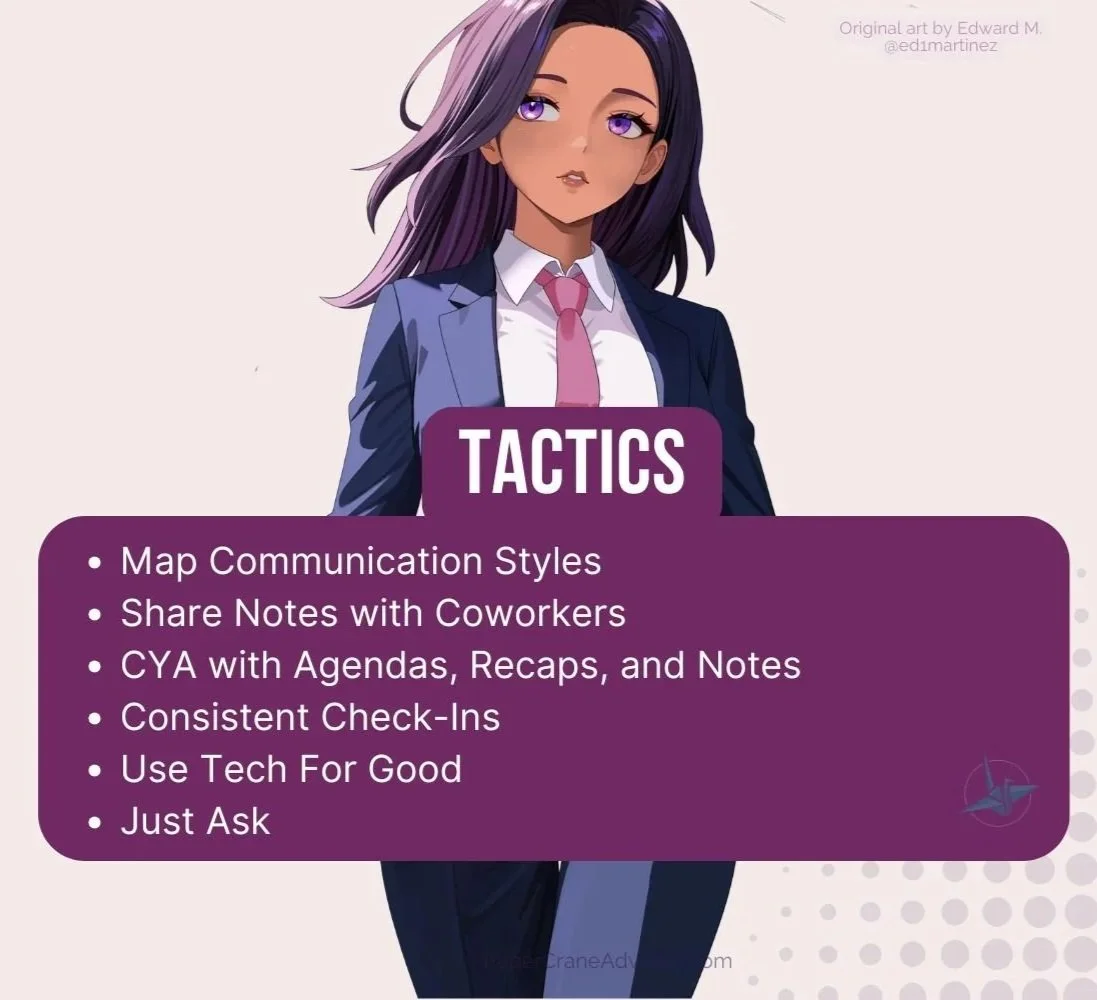Managing Up: Handling a Four Bar Boss Fight
You thought figuring out what made your coworkers tick was the whole point of the group project, but little did you know, that was only the mini-boss. Enter: your manager. The actual sub-boss with like 4 health bars (final boss TBD based on where you work, but let’s focus on this one for now). Suddenly, you're expected to magically know how to navigate this fight with someone who’s speak in corporate riddles like "let's circle back on that" and "I'd love to get your thoughts when you have bandwidth.” You’d rather try and plug your damn controller into the other second port and hope it works (IYKYK).
If you're neurodivergent, this gets even more fun. While your neurotypical colleagues seem to instinctively know when to speak up in meetings or how to "read the room," you're over here wondering why your manager said "great job" but their facial expression suggested otherwise as the smile that didn’t reach their eyes is staring you down in the room.
Time to bust out that secret item to make the boss fight a bit easier: managing up. It's a legitimate career survival skill! And when you crack the code, your analytical brain and attention to detail can actually make you better at it than the people who think they're naturally gifted at corporate schmoozing.
WTF Is Managing Up?
Managing up is essentially being strategic about how you work with your manager to get sh*t done. It's not about sucking up or manipulation—it's about understanding what makes your boss tick, anticipating their needs, and communicating in ways that actually land.
Research consistently shows that managing up is a critical factor in career advancement. A 2024 study on employee engagement found that companies with highly engaged employees saw a 21% increase in profitability and 17% boost in productivity—and guess what drives engagement? Strong manager-employee relationships. According to Gallup's latest research, managers drive 70% of the variance in team engagement, making your relationship with your boss literally make-or-break for your career trajectory.
Studies on upward influence tactics show that employees who effectively use strategic approaches with their managers receive higher performance evaluations, better salaries, and more workplace flexibility. Research from 2024 on "workplace upward networking" found that employees who actively build relationships with their leaders gain higher performance evaluations, better promotion opportunities, and greater access to organizational resources. The kicker? Most people are terrible at it because they assume good work speaks for itself.
Spoiler alert: it doesn't.
Perhaps this is my personal manager side speaking, but your manager is supposed to be your advocate in the room when they manage up. A good manager should understand what you’re doing and why you’re doing it, remove blockers, trust your skills and instincts, challenge you when appropriate, give you space to expand your skillset, cover when you need to rest, and represent you honestly and effectively to your skip/their manager. This involves some kind of ongoing communication between the two of you and learning subtext and unspoken rules in many situations (I can hear the screams now).
Worry not friends, I’ll try and be a less annoying Navi and help teach some starter skills and techniques that you can use.
Practical Strategies
Decoding Your Manager
Think of your manager as a complex system you need to understand: you need to identify patterns, inputs, and expected outputs.
Map their communication style:
Do they want the bottom line first, or do they need context?
Are they email people or face-to-face people?
What time of day are they most receptive?
How do they prefer to receive “bad” news?
Create your own “manager strategy guide"
Note any patterns (whether mentally or physically): what stresses them out? What makes them light up? What’s their business flow (do they have Management Meetings on Tuesday so always ask you for numbers last minute Monday night?). This isn't stalking—it's data collection that helps you communicate more effectively. It’s like knowing your coworker’s favorite coffee order.
Share Your Notes
Speak with your other teammates or those who work around both of you and get any tips on communication styles and strategies. If needed, work together to try and lessen your own loads together. Using that last minute stats example above, if you’re ALL getting the same request on Monday at 3pm, why not get together for a standing Monday meeting and hammer it out ahead of time.
JUST ask
You’re not expected to sit down and stalk your manager around the halls or online like Nancy Drew (but feel free?). I recommend you sit down with this human and have a direct conversation and ask how they like to work and share how you like to work as well.
Whenever I get get a new team or new hire, I have these chats and with my own managers. I like to establish:
Preferred communication styles (email, chat, phone)
Meeting cadences
Working Styles (great to establish if you hate being micromanaged, or how you like to be given directions)
Workload Splits (how time is spent)
The Art of Strategic Documentation
If your brain probably craves clear, written information, use this to your advantage. Make sure all meetings have an agenda before hand (and it’s okay to ask for one if they didn’t add one). After meetings, send recap emails: "Just to confirm my understanding…" or “Here are my notes to ensure we’re on the same page.” This isn't annoying—it's professional and helps everyone stay aligned…and a great CYA.
Come with Solutions or Ideas
Instead of just “reporting problems”, come with options you’d like to try or even say “I tried all these things and I’m a little stuck. Do you have any other ideas from your experience?” Your analytical brain is perfect for this. "I noticed X issue. I've researched three potential solutions: A, B, and C. Based on our constraints, I recommend B because…" These don’t have to be perfect, but they show you’re thinking.
Build Predictable Check-ins
Regular one-on-ones aren't just for your manager's benefit—they're for yours, too. Having a predictable time to discuss priorities, challenges, and feedback reduces the anxiety of not knowing where you stand.
I recommend one-on-ones always include: Blockers, Asks, and General Updates. The day of the meeting, I usually send what I need to discuss in each bucket. It establishes what’s important and what actually needs to get done.
Technology FTW
Often, you’ll send something that requires your manager to do something. Set a small 15 minute meeting on their calendar that is free time but pops a reminder that says “Send Lex Notes about X Document” and in the body of the email note that “this isn’t an actual meeting, this is to do X by this time as we agreed” with the document or link. You can also set up things like this in Slack or Teams. Use Outlook to have a shared to-do list with assignments (or Notion, or Asana, etc).
I recommend giving said person an FYI about this working practice, but I’ve found it helps everyone stay on track. We have technology, use it as a tool.
Scripts for Common Scenarios
I know, all of this sounds great, but sometimes you just want a guide. Because sometimes you need the exact words. Here’s a small tip box.
Asking for clarification: "I want to make sure I understand the priority here. When you say [thing they said], are you looking for [specific interpretation]?"
Proposing ideas: "I've been thinking about [problem/opportunity]. Would you be open to hearing a potential approach I've been researching?"
Following up: "I know you mentioned you'd get back to me about [thing] by [time]. Should I assume this is still on track, or has the timeline shifted?"
Saying “no” because you will literally die if they assign you something else: “I understand that both A and B are important; however, our time/resource/budget can only accommodate one of them in the timeframe. Which should we focus on?”
Bottom line
Managing up isn't about changing who you are—it's about strategic communication and relationship building. Your brain might approach it differently than your colleagues, but that doesn't make you worse at it. In many ways, your systematic thinking and attention to detail can make you even better. Let's also acknowledge the second phase of this boss fight: all this social navigation is exhausting when your brain works differently. Research on masking in neurodivergent adults shows it can lead to significant mental fatigue and burnout; we know this. Build in recovery time. If you have a high-stakes meeting with your manager, don't pack your afternoon with more social interactions. Plan for the energy cost and give yourself space to recharge. Prepare yourself as best you can.
The goal isn't to become a corporate politician. It's to create working relationships where your manager understands your value, supports your growth, and gives you the clarity and resources you need to do your best work. Start small. Pick one strategy and try it for a few weeks. Notice what happens. Adjust accordingly. Your analytical brain is going to love turning this into a system you can optimize over time.
And remember: your boss is human, too, with a boss of their own. Grab a tasty drink and just ask how they like to work and share how you do, too. I’ve had some of my best chats at Street Fighter III: 3rd Strike arcade cabinet. You got this.


